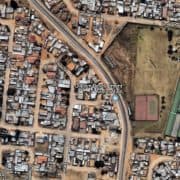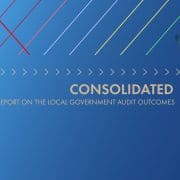|
Getting your Trinity Audio player ready...
|
In part two of our local municipality mini-series, we describe investigations relating to some municipalities which were reported to us for irregular procurement processes. Part one dealt with the 2019 Government Performance Index, released recently by Good Governance Africa.
Corruption Watch gets most of its reports from people wanting to expose corruption in provincial government departments, followed by national departments and local government in third place. Local government corruption reports account for 25% of the total number of complaints we received in 2018.
The trending corruption issues reported by the public over the year were abuse of power, bribery and procurement corruption, and these issues have been of greatest public concern ever since we opened our doors in January 2012.
In January 2015, we received a report alleging misappropriation of funds at Jozini local municipality, part of uMkhanyakude District Municipality in northern KwaZulu-Natal. The whistle-blower alleged that R92-million was received by the municipality, to build new halls and renovate existing ones, amongst other activities – but that a substantial amount of these funds was unaccounted for.
We were also advised that an investigation was launched to probe these allegations and that in early 2014, a forensic audit was carried out by Deloitte South Africa. We understood that the two reports produced were in the municipality’s possession.
As this was a substantial sum of public money at stake, we decided to investigate the matter. However, our request, sent in July 2015, to have access to the reports in terms of the Promotion of Access to Information Act of 2000, was ignored. In 2018 we again requested the documents and despite numerous promises to send the documents, our contact at the municipality started to ignore calls and e-mails as recently as February 2019. We therefore were forced to close this investigation with no resolution.
It will come as no surprise, then, that in the 2019 GPI Jozini was ranked among the bottom 20 worst-performing municipalities, sitting at 195 out of 213 municipalities. Jozini was at 210 out of 234 in 2016.
The municipality’s official audited statements for 2016/2017 reveal that reasonable steps were not taken to prevent unauthorised expenditure of R11.5-million (42.8% of the operating budget), and that there were several cases where procurement processes were not followed. The Auditor-General (AG) did note an improvement in Jozini’s financial records, giving the municipality an unqualified (emphasis of matter items) audit result in 2017 and 2016, after a qualified result was given in 2015. The former is the same as an unqualified opinion with no findings, except that the AG wants to bring something particular to the attention of the reader.
On the website of Municipalities of South Africa, it is noted that “Significant portions of Jozini have been neglected in terms of economic development. There is a great disparity between the level of service and infrastructure provision between settlement nodes such as the towns of Mkuze and Jozini, and the surrounding rural areas. Most of the rural area is associated with a lack of development, poverty and poor service provision.”
This is not surprising when the 2017 audit report reveals that the municipality underspent its capital budget by a shocking 89%, with 0% spent on repairs and maintenance. On the other hand, it overspent its operating budget by 12%.
Unless there is a will to co-operate, not only with oversight authorities but also with watchdog organisations such as CW, a municipality such as Jozini will remain opaque and poorly run.
Unexplained payment
Another municipality that came under our scrutiny was the former Aganang in Limpopo. We received allegations of financial maladministration at the municipality, in respect to a security contract with Rheinland Investments t/a Africa Security. Our source alleged that questionable additional payments to the value of over R660 000 were made to the security company.
We wanted to establish the rationale behind these additional payments, and confirm that the municipality had followed the correct procedure as set out in the Municipal Finance Management Act. Our questions specifically pertained to the process of getting council approval for the payment to Africa Security – we requested information about whether a council meeting had been held and if so, the minutes of that meeting. If no meeting had been held, we wanted to know the reasons and on what basis the payment was approved.
We received no response to our query.
After the 2016 local government elections Aganang was disestablished and incorporated into Polokwane and Blouberg, so there is no result for it in the 2019 GPI. In the 2016 edition, though, it came in at 189 out of 234 and in the provincial rankings was 20th out of 25. It received a qualified audit from the AG in both 2014 and 2015, meaning that the AG expressed reservations about the fair presentation of the financial statements because of some departure from the generally recognised accounting practices – but these were not serious enough to warrant an adverse opinion or disclaimer of opinion.
A recent call to the Polokwane municipality was also fruitless, as the person we spoke to said they did not know what happened with Aganang.
Dodgy tender
Corruption Watch investigations are only as successful as the co-operation we get from those we approach for assistance. We received a report relating to Govan Mbeki Municipality in Mpumalanga. Our reporter, a service provider to the municipality, alleged corruption in the awarding of a tender to upgrade the Embalenhle section 22 sewer reticulation network. The tender was worth R33-million.
But proper procedures were not followed, we were told. The municipality and the Department of Human Settlements awarded the lucrative tender to Dumezulu General Dealer Construction in 2014. During the bidding process 15 companies showed interest in the tender, according to a document which CW has seen. Dumezulu had submitted the highest price of all 15 bidders. At over R46-millon it was substantially more than double that of the cheapest bid amount of R18.5-million, and exactly double the second-lowest bid of R23-million – however, it was appointed as the preferred bidder.
Our whistle-blower also alleged that from May to June 2014 the Mpumalanga Department of Human Settlements (MDHS) transferred an amount of R50-million to the municipality for the sewer reticulation tender, though the tender was valued at R33-million.
Furthermore, from September to October 2014 the MDHS transferred another R10-million to the municipality for the same project. This means that the department transferred an extra amount of R27-million in total, to the municipality for this particular tender.
We sent a query to the municipal manager to help us establish the facts. We wanted to know why Dumezulu was appointed even though their price was higher than all the other bidders. We also asked the municipality to clarify the reason why, on a budget of R33-million for the tender, ultimately it received R60-million, and we requested that the municipality account for the additional sum.
We received no response.
Govan Mbeki Municipality is one of the better-performing municipalities. It topped the provincial list in the 2019 GPI, and for the last four years has received an unqualified (emphasis of matter items) audit result from the AG. It overspent its 2017 operating budget by a massive 36.5% and underspent its capital budget by 30% – but it incurred just 4,5% of unauthorised, irregular, fruitless and wasteful expenditure. Like Jozini it also spent nothing on repairs and maintenance for the period.
Procurement processes not followed
A whistle-blower brought a complaint to us about Victor Khanye local municipality, in Delmas, Mpumalanga. Our reporter alleged that tenders had been fraudulently awarded. We investigated, because misuse of money intended for public procurement is corruption that benefits only the parties involved.
The source, an employee in the municipality’s supply chain management (SCM) department, told us that the company that won the tender – awarded to Trio Supplies on 7 August 2014 for the supply of water and piping related stock – was not even registered as such with the Companies and Intellectual Property Commission (CIPC).
Not only that, but the whistle-blower alleged that another municipal employee, who was employed as a deputy manager of water and sanitation, was involved in irregular procurement practices – including that of the contract mentioned in our whistle-blower’s complaint. This behaviour was said to have continued for a length of time and eventually the municipality investigated. However, we have received no information about the investigation.
The water and sanitation manager was authorised by the CFO at the time to conduct the procurement, a letter from the municipality confirmed – but it was also alleged that officials in the SCM department were instructed by the CFO not to get involved in the awarding of this contract. We did not obtain any confirmation of delegation of authority for this role, and were not informed why the SCM department was bypassed, in contravention of the SCM policy.
Three companies, including Trio Supplies, submitted written quotations on 31 July 2014. However, CW established that the tender was signed off to Trio Supplies before the other quotations were submitted to the manager involved.
The purchase of necessary items was approved, and an amount was made available. The municipality informed us that the goods and services were received – but the Trio Supplies representative claimed the opposite. The order was withdrawn and cancelled, he said.
We investigated and found that some deviations from the SCM policy had occurred. We asked the municipality several questions regarding the findings of the municipality’s investigation and any disciplinary action taken, the steps taken by the municipality to investigate the irregular procurement process, and why the winning bidder was awarded the contract when they were not registered with the CIPC and had no tax clearance certificate – among others.
We were shunted from one person to another and eventually ended up at the current CFO, who has not responded to any of our queries, despite numerous e-mails, phone calls and messages. Accordingly, we have closed the investigation.
Victor Khanye municipality ranked 96 out of 213 on the 2019 GPI, and 8th out of 18 in Mpumalanga. The municipality has received qualified audit outcomes for the last four years. In 2017, according to the AG, it overspent its operating budget by 9.3% and underspent almost half of its capital budget, or 48.3%.
An alarming 32.3% of wasteful, fruitless, irregular or unauthorised expenditure was recorded – more than 1.5 times the expenditure for similar municipalities both in Mpumalanga and nationally. This is one of the factors that contributed to its qualified audit opinion, and the AG has made mention of irregular procurement processes in all of the municipality’s recent audit reports.








